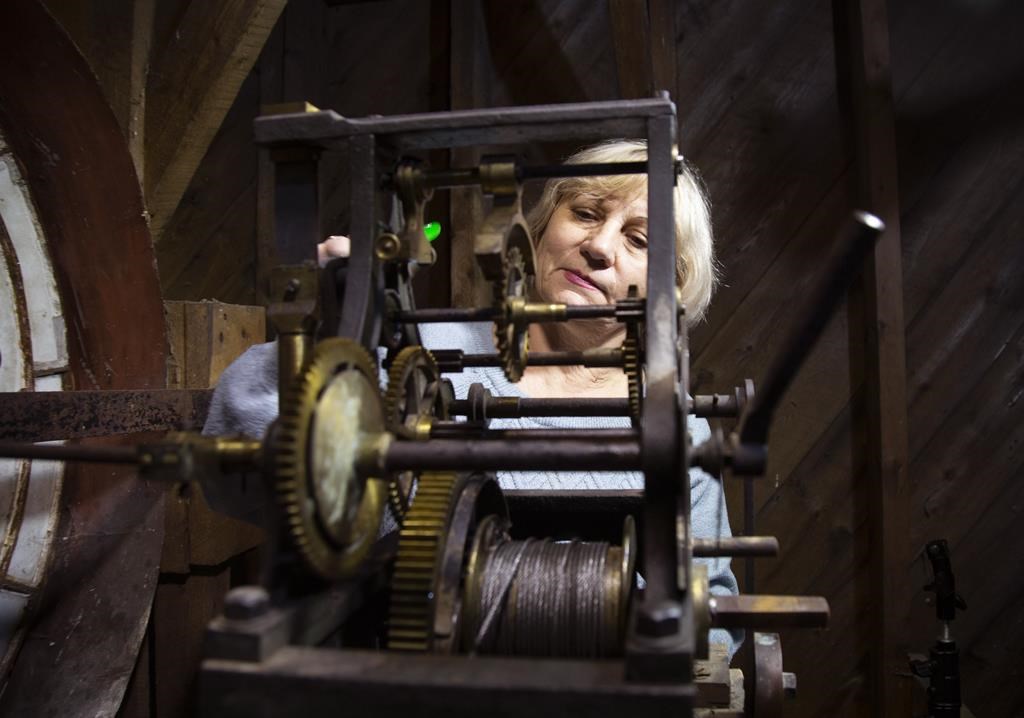Ukrainian watchmaker fixes Newfoundland clock tower that hasn’t told time in decades

Posted Dec 23, 2023 07:00:00 AM.
Last Updated Dec 23, 2023 10:24:14 AM.
ST. JOHN’S, N.L. — In an improbable confluence of geopolitical strife, childhood wonder and salty air, a Ukrainian watchmaker has repaired a 118-year-old town clock in eastern Newfoundland that hadn’t told time in decades.
Liudmyla Pass, 68, had been in Newfoundland less than a month when she climbed the stairs to the long-silent clock tower in the coastal town of Carbonear on Tuesday, armed with her tools and five decades of expertise.
About four hours later, she had the clock’s gears clicking and turning, said her daughter, Yulia Veretennyk. The metal was rusty and crusted over with salt from the ocean air, said Veretennyk, translating for her mother. Pass gave it a good scrub and then carefully reset the machinery.
“I’m very proud, but I always was proud of my mom because I know she’s unique,” Veretennyk said. “I’m happy that she’s finally appreciated.”
Pass landed with her husband at St. John’s International Airport on Nov. 25 after fleeing the Russian invasion of her country. Veretennyk, 37, was already living in Newfoundland; she arrived in May 2022 with her husband and two children on the first of four flights chartered by the Newfoundland and Labrador government for Ukrainians fleeing the war.
Veretennyk and her family, including her mother and father, now live in Chapel’s Cove, a coastal town of about 1,065 people on Newfoundland’s Conception Bay. Nearby Carbonear is among the oldest European settlements in the province, and its clock tower rises from the town’s old post office, a butter-coloured clapboard building with forest green trim along the community’s main street.
The building is now home to the Carbonear Heritage Society, which posted about the clock tower on social media in October. “Wouldn’t it be great if in 2025, on the clock’s 120th birthday, it was working again!” the post said.
Veretennyk saw the post and immediately wrote to them about her mother’s imminent arrival.
Pass was five years old when she fell in love with clocks. She first encountered a clockmaker at a toy shop in her village and she was completely transfixed, Veretennyk said.
“She thought they were from a fairy tale, or like Merlin,” she said. “She thought they were some kind of magic.”
When Pass was 15, she discovered a college nearby where she could learn to fix clocks and watches, but her parents didn’t want her to go, Veretennyk said. So she ran away. Pass stayed with friends and began her education, and her parents had no choice but to accept it.
Ukraine was then part of the Soviet Union, and the government of the time dictated where people lived and worked, Veretennyk said. When Pass graduated, she was sent to a town of about 16,000 people in central Ukraine. She was 17 when she opened her business there, fixing people’s watches and clocks, Veretennyk said.
“She was the only one person in our town fixing clocks and people knew her,” Veretennyk said.
Since she worked her magic Tuesday, everyone around Carbonear knows her, too. Keith Thomas, chair of the Carbonear Heritage Society, said Pass’s repair has shown people that cherished buildings and objects from their past are worth fixing — and worth saving. He said people now look up at the tower and feel pride, gratitude and wonder.
“To have a Ukrainian person, a couple that were forced out of their country due to war, come to the shores of a little island called Newfoundland, and then fix a clock tower in a historic building? Well, that would give you a cold shiver,” he said in an interview.
Thomas is 57 and he said he’s never known the clock to work properly and tell time.
Veretennyk said that since her mother fixed the clock, people have been bringing her their own watches and clocks to fix, ensuring her mother won’t have to leave her craft — or her business — behind in Ukraine.
“We have no choice,” Veretennyk said about Pass launching a new business in Newfoundland. “Everyone wants their own clocks, watches from (their) grandfathers, grandmothers to be fixed, and we can’t say no.”
This report by The Canadian Press was first published Dec. 23, 2023.
Sarah Smellie, The Canadian Press








